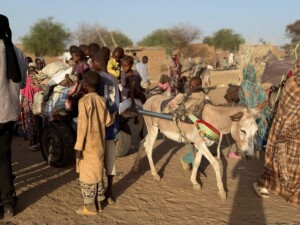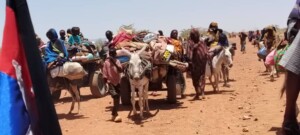Darfur women accuse govt of violating the Juba Peace Agreement as representation promise is broken
Women who took part in the Juba peace negotiations on the Darfur track accuse the Sudanese government, the Peace Commission, and the rebel movements of violating the Juba Peace Agreement’s promise of 40 per cent women’s representation in governance.
 Women in El Koma, North Darfur, celebrating International Women's Day (Albert González Farran/UNAMID)
Women in El Koma, North Darfur, celebrating International Women's Day (Albert González Farran/UNAMID)
Women who took part in the Juba peace negotiations on the Darfur track accuse the Sudanese government, the Peace Commission, and the rebel movements of violating the Juba Peace Agreement’s promise of 40 per cent women’s representation in governance.
General principle 1.20 of the Juba Peace Agreement stipulates "the importance of fair and effective representation of women at all levels of power and decision-making positions, at a rate of not less than 40 per cent", which was agreed on after fierce negotiations by women with reference to United Nations Security Council Resolution 1325 on Women, Peace, and Security.
One of the women, North Darfur’s Minister of Youth Hikma Ibrahim, criticised the authorities for not representing the women that negotiated on the of the Darfur track in all the committees that were formed to implement the Juba Peace Agreement.
These committees include, among others, the Peace Parties Committee, the Security Arrangements Implementation Committee, the Higher Committee for the Implementation of the Darfur Process, and the Supervisory Committee for Choosing a Wali for Central Darfur, which consists of 9 members, all men.
She voices her criticisms in a press conference in Khartoum on Sunday, and highlighted the lack of adequate representation of women in general, and the women who negotiated on the Darfur track in particular, in the Prime Minister’s new Road Forward Initiative.
The initiative was criticised for its lack of democratic participation and representation of women and youth.
The initiative's refusal to adhere to the agreed percentage of women's representation in various levels of governance, in addition to the lack of participation of young people, constitutes a clear violation of the Juba Peace Agreement according to the women.

(Sojoud Elgarrai/UNAMID)
Demands
The women demanded a restructuring of the National Peace Commission within two weeks. Najat Suleiman, a member of the women's negotiation team in the Darfur track, demanded that the Peace Commission present a plan on how to implement the participation and representation of 40 per cent women in its commission next week.
They also demanded the Transitional Sovereignty Council and its partners establish equal representation in the Legislative Council within a maximum period of one month.
In the same timeframe, the women demanded the implementation of the decision to form a special Commission for Gender Equality and Women Empowerment. This commission should have no less than 70 per cent women's representation.
They further demand the formation of a coordinating committee of Darfuri women negotiators to secure the participation of women until the full establishment of the special commission and the activation of the Constitutional Court, so that women can resort to the court if the 40 per cent representation agreement is violated.
On Saturday, the Sudanese Organisation for Research and Development (SORD) organised a ‘workshop on the merits of establishing the Commission for Gender Equality and Women Empowerment’ with the aim of supporting the democratic transformation and peace in Sudan from a feminist perspective.
In his speech on Saturday at the open dialogue of the workshop, Senior Advisor to the Minister of Justice Mohamed El Numan said that The Ministry of Justice submitted four draft laws related to the constitution, elections, human rights, and internal security.
SORD said that the Ministry of Justice formed a committee that includes nine advisors, seven of whom are women, to implement the legal agreements stipulated in the Constitutional Document and the Juba Peace Agreement.
El Numan confirmed that the ministry is waiting for the draft proposal for the Commission for Gender Equality and Women Empowerment and said that a legal expert has been assigned this task.
Dr Samia El Nager said that they submitted the proposed draft three times to the former Minister of Labour and Development, the Ministry of Justice, and the Council of Ministers, but that they did not receive a response.
'We don't want any apologies. We want fairness and respect for our rights'
Referring to the struggles of women and their participation in the revolutions of October 1964, April 1985, and December 2018, she explained that “we [women] were optimistic after the brilliant revolution and the momentum it created and hoped that the government would start building with serious will”.
She added: "We don't want any apologies. We want fairness and respect for our rights."

16 Days of Activism Against Gender Violence, December 2019 (RD)
Women's representation in Sudan
The participation of women in Sudan’s post-revolution political process is “inadequate and incomplete”, according to the Sudanese Women’s Group for Peace and Security.
Last year, women protested against the low representation of women in high-level government posts after PM Hamdok announced 18 new state governors of which only two were women.
While Sudanese women continue to be disproportionately affected by violence in its various forms in the country, they have also been at the forefront of the revolution, demanding justice and peace.
News outlets estimated that about 70 per cent of the protesters during the 2018 December Revolution against the regime of Al Bashir were women, making them visible leaders on the frontlines of the revolution.
Yet, Sudanese women remain on the sidelines. Only 12 per cent of the Juba Peace Agreement table included women. Women’s rights groups in Darfur and Khartoum continue to call for a broader representation in the new transitional government and in all aspects of Sudanese life.











 and then
and then